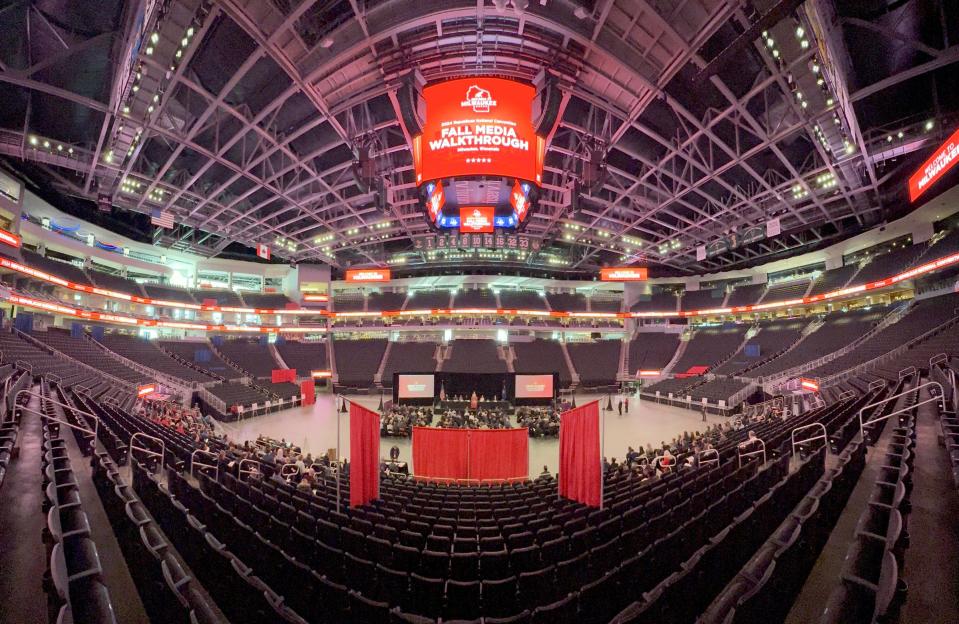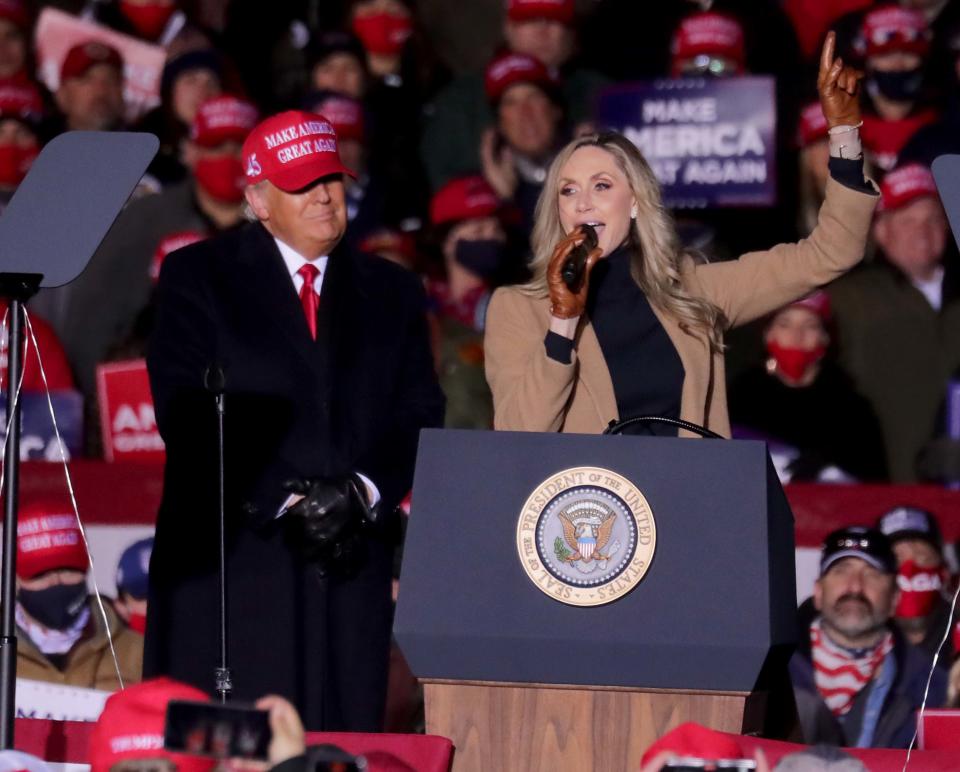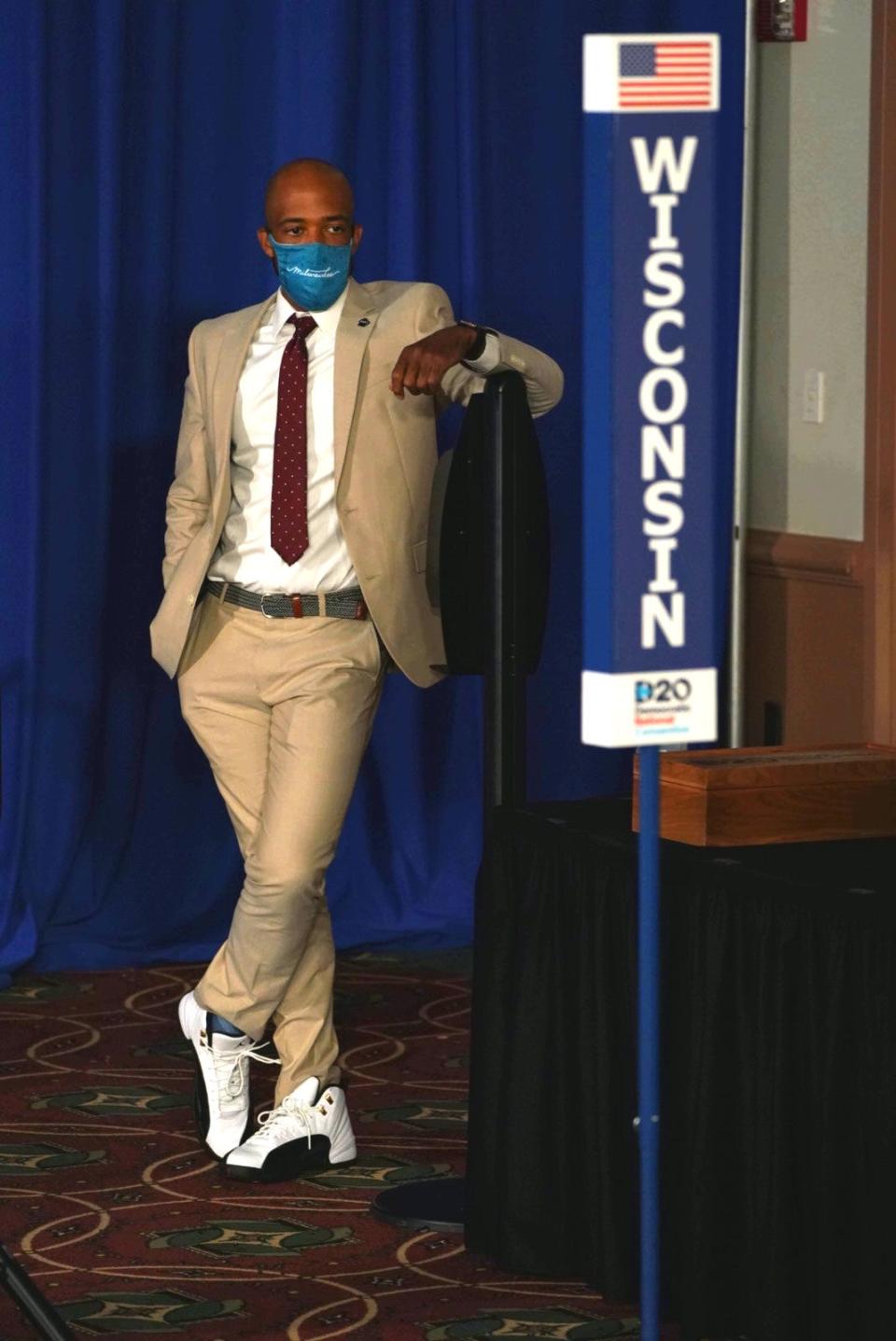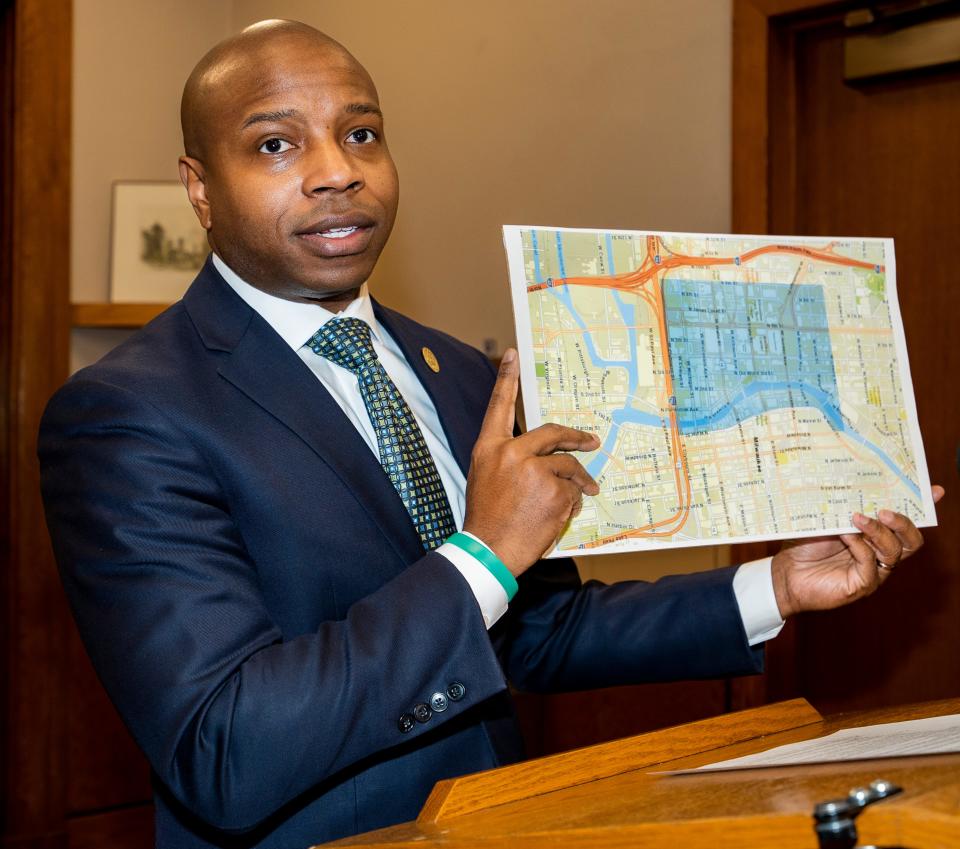We know Trump will be the RNC nominee, but here's why conventions are still important
- Oops!Something went wrong.Please try again later.
- Oops!Something went wrong.Please try again later.
It's no surprise how the Republican National Convention in Milwaukee will end this July. Former President Donald Trump, who earned the presumptive nominee title in March, will formally become his party's selection for president.
That's not the way it used to be.
Until about 50 years ago, conventions still had smoke-filled rooms and private discussions about who to nominate for the presidency. Now, that gets sorted out much earlier, in state caucuses and primaries.
But even if the nomination is much more predictable by summer, conventions are still valuable — for parties to conduct official business, for their ideas to be shared widely in the media, and for the cities who host them.
"These conventions are still important. But they are important as media events, and as events that convey what the party is — what it looks like, what its objectives are — and can impact how people feel about the party and therefore who they vote for," said Heather Hendershot, a professor at Northwestern University who has researched media coverage of conventions and the 1968 Democratic National Convention in Chicago.
The Journal Sentinel spoke with politics and media experts about how conventions have changed over time, and with event organizers about what the modern convention experience is like:
Rolling out the nominee is still a ceremonial part of conventions
Conventions as we know them today — major events held in large cities attended by party insiders — began in the early- to mid-1800s. State parties needed to coordinate their activities and nominate someone who would appear on the ballot across the country, explained University of Wisconsin-Madison political science professor Barry Burden.
"All that changed 50 years ago, when the parties changed their nomination systems to emphasize primaries and caucuses as the ways that delegates would be selected," Burden said.
Democrats first made those changes for 1972, and both parties added to those reforms over time.
In other words, there's now less drama and suspense about who the nominee will be. Since around the 1970s and '80s, the "convention was really just a coronation for the person who had already proven themselves by winning delegates out in the states," Burden said.
There have been years, though, where the Democratic nominee was less obvious closer to the convention, including close races in 2008 between Barack Obama and Hillary Clinton, Clinton and Bernie Sanders in 2016, and Jimmy Carter and Ted Kennedy in 1980.

That uncertainty is less likely on the Republican side, Burden explained, because of the way parties award delegates. Republicans tend to use a winner-take-all system, so candidates who perform well in primary elections "rack up a lot of delegates very quickly."
Trump won enough of those delegates by March 12 to become the presumptive Republican nominee, four months before the convention. Messaging from convention organizers then became clear that the overarching purpose of the RNC is to nominate Trump.
"We really want to be able to not just roll out our nominee, Donald J. Trump, and the Republican Party, but we want to roll Milwaukee out to the entire world," Republican National Committee chairman Michael Whatley said in an interview with WISN-TV's "Upfront" earlier this month.
Trump has said he's likely to announce his running mate in Milwaukee at the RNC, though vice presidential picks have typically been announced in the immediate days before the conventions in 2016 and 2020.
More: The RNC in Milwaukee is largely led by women. Will the convention messaging help Republicans?

RNC, DNC are a rare time and place for whole party to get together
Conventions also give parties a chance to unify and go into the general election on the same page.
"The convention is really the only time that the whole party operation is in one place at one time, and they can have those deep conversations and get themselves together," Burden said.
That includes developing the party platform, a guiding document that outlines the party's message, positions on issues and criticisms of the opposing party. Factions in the party that are unhappy about the nominee can be appeased if they get some space in the platform, Burden noted.
In 2020, Republicans took the unusual step of not writing a party platform, instead carrying over the document from 2016. It was the first time a major party didn't adopt a platform since the 1860s.
Lara Trump, the new co-chair of the Republican National Committee and the former president's daughter-in-law, told the Journal Sentinel in March she expected a return of the party platform in 2024.
"If you want to call it a common-sense platform, perhaps that would be a good way to go," she said.
More: RNC may again adopt a party platform this year after not having one in 2020, Lara Trump says

Conventions are made-for-TV events, but media players have changed
How people watch that nomination and official party business unfold has changed, too.
Television viewership of conventions declined when the rise of cable gave people more options to watch, explained Hendershot, the Northwestern professor. Instead of watching gavel-to-gavel coverage, viewers can now catch highlights and live updates on social media. It's more like a "series of small sprints" than a marathon, she said.
In an interview with the Journal Sentinel, producers involved in the RNC said reaching younger audiences through new media like short video is "absolutely of interest." New media players that haven't been involved in broadcasting conventions before will have a "large presence in the hall," they said.
Planners also meet with Silicon Valley tech companies like X, Meta, Microsoft and Apple to "have an idea of what their tools are and their resources, but also to kind of get a sense of what trends, what platforms speak best to different demographics."
The changing media landscape also affects the convention schedule. When CNN began round-the-clock coverage, networks decided to focus on the prime-time hours. That's how parties decide "who's going to speak and when," explained Kathryn Cramer Brownell, a professor at Purdue University who has written about politics and cable news.
More: 'The Daily Show' will broadcast from Milwaukee during 2024 Republican National Convention
More: GOP convention will draw global news coverage. Milwaukee could benefit from that focus
By 1952, when TV sets became more common in homes, parties began to understand that coverage was important and tried to "better stage-manage what they're presenting before the cameras," Hendershot said. The mostly virtual, pandemic-era conventions of 2020 gave the parties even more control over crafting their storytelling.
"That measure of control is something party leaders and candidates themselves have long wanted," Cramer Brownell said, "even though part of the appeal of conventions being televised was that they were live, and people didn't know what was going to happen."
In 2020, the DNC had a mix of live and prerecorded segments, including a "roll call" featuring delegates in their home states. That pre-production wasn't a new phenomenon, though. Biographical, half-hour films were historically aired at conventions; one about Robert F. Kennedy won an Oscar.
Some people close to Biden are pushing to make this year's DNC a hybrid event, Politico reported, with in-person speeches and pre-taped parts like the roll call, to limit potential disruptions from protestors. In statements, DNC officials have said the convention will "build on many of the innovative elements pioneered in 2020."
The RNC organizers said they couldn't share specifics of plans for pre-recorded content, but said the convention is "first and foremost a live event." Organizers pointed out they have to be prepared to change their plans when breaking news, like a global event or a court decision, shifts the conversation.
Another element of surprise could be celebrity sightings, which can help raise the visibility of campaigns and conventions. In 2016, Clinton's use of celebrities was more about encouraging civic action, Cramer Brownell said, and Trump's celebrity was himself.
"Now, he's got a very different public image, a very different type of celebrity that he's trying to cultivate," she said, one that's less rooted in "The Celebrity Apprentice" and more about his role as a former president wrapped up in legal battles.

Host cities benefit economically, but could also see protests and unrest
Media exposure also benefits cities that host party conventions. Democratic officials like Mayor Cavalier Johnson have supported bringing the RNC to Milwaukee to raise the city's profile and spur economic activity.
Officials in Cleveland, the last city to host a full-scale RNC, have recommended managing expectations — some businesses there prospered, while others saw a drop in sales. Crowds, traffic and extra security can prevent typical shoppers and diners from going downtown.
But city officials also have to manage protests and demonstrations, balancing free speech and safety. In Milwaukee, activists have pushed for the ability to protest closer to the convention venues, while Republican officials have lobbied the Secret Service to move the demonstration area further away.
More: How Cleveland handled security, protesters at 2016 RNC. Few arrests, small crowds.
In Chicago, parallels to the 1968 DNC are top of mind, including large numbers of anti-war protestors, Hendershot said. But unlike that year, there are no signs the National Guard will be activated in advance and city officials aren't trying to prevent media from covering protests.
Activists will certainly protest the war in Gaza at the convention, Hendershot said, but "what's unclear to me is to what extent there will also be right-wing protestors ... (or) Trump supporters who are here to create disorder. That's very different from 1968."
More: Democrats fear chaos of 1968 convention as they prepare to renominate Joe Biden in Chicago
At the RNC in Miami Beach that year, protests happened a few miles away and TV networks undercovered them, Hendershot said. Major networks did cover protests as they happened on the convention floor in Chicago, but were also accused of bias for showing police brutality outside.
Protesters this year "are continuing to keep the spotlight on a very important issue. Even with lowered TV coverage, those images are going to end up online, in newspapers, obviously, and via social media channels," Hendershot said. "That imagery is still going to be very important."
This article originally appeared on Milwaukee Journal Sentinel: RNC in Milwaukee matters, even if we already know Trump's the nominee

